This post is here to help if you have a toddler not eating. It’s common, stressful, and often, can be explained. Here’s what’s normal, and what’s not so you can improve the situation—or at the very least, relax.
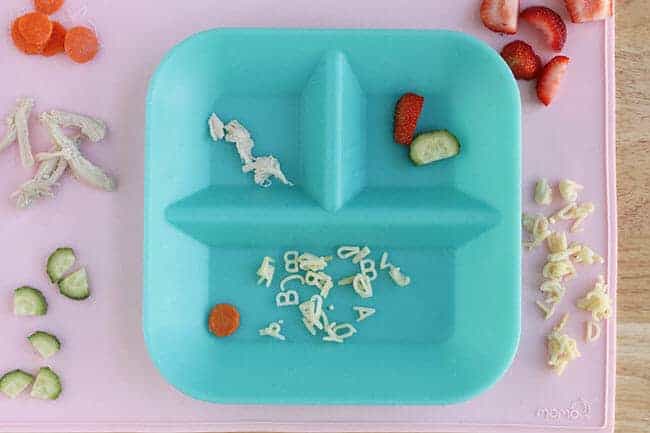
Toddler Not Eating
You get everyone to the table and bring out the food. Your toddler won’t eat, throws a fit, or fusses. No matter how hard you try, this is often the reality of feeding toddlers. The good news is that a toddler not eating is actually quite normal.
The bad news? It’s difficult to know exactly why your toddler isn’t eating—and what exactly you should do about it. But there are simple steps you can take to improve the situation.
Family meals are a chance to be together at the end of a long day, to enjoy food, and to create rituals and routines. But when a toddler won’t eat, whether at the family table or not, it can wreck even the best of intentions. And it can make mealtime a huge source of stress.
The reasons a toddler won’t eat are unique to each kiddo and situation, so I’m going to try to be as comprehensive as possible here.
Table of Contents
- Toddler Not Eating
- Daily Toddler Nutrition
- Why does my toddler refuse to eat?
- How do I get my picky toddler to eat?
- Why did my toddler stop eating?
- What if a toddler won’t eat anything but snacks?
- Is it normal for my toddler to refuse to eat?
- My toddler won’t eat because he's sick. Should I worry?
- My toddler won’t eat anything but milk. Help!
- How can I increase my toddler’s appetite?
- Why won’t my 1-year-old eat?
- Why won’t my 2-year-old eat?
- Why won’t my 3-year-old eat?
- My toddler won't eat breakfast. Why?
- My toddler is constipated—is that why she won’t eat?
- Why does my toddler always want a bedtime snack?
- Frequently Asked Questions
- How do I know if my toddler’s eating problems are serious?
Your toddler won’t eat? Help is here!
Sign up for our email updates to get tips and ideas sent to your inbox.
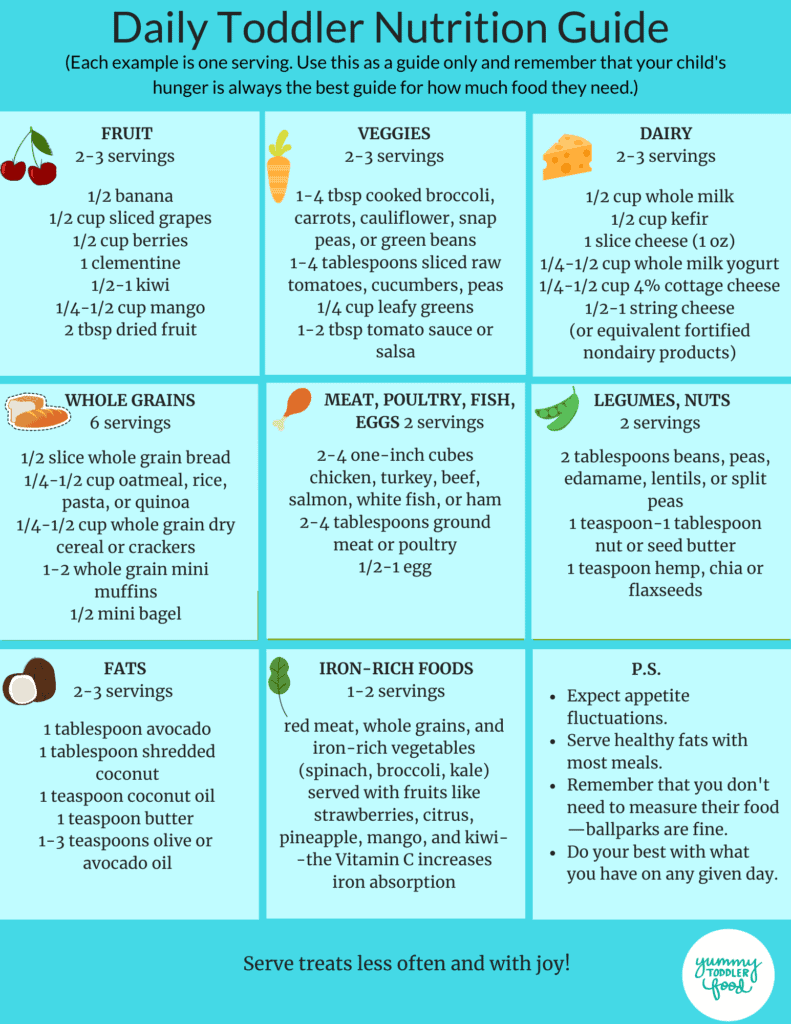
Daily Toddler Nutrition
For a quick reference, you can download my Printable Toddler Nutrition Guide so you can refer to it for reassurance and information. Use it as a guide, not a hard-and-fast rule, since kids aren’t robots and will not eat like a chart. I share this first because portion sizes may actually be a lot smaller than you realize and often we are simply overestimating the amount that our kids need.
(Aim to serve healthy fat foods with most meals or snacks, since little kids need those healthy fats for proper brain development.)
Why does my toddler refuse to eat?
This is the most important thing to consider: It’s very possible your toddler is not eating because he simply isn’t as hungry as he was when he was a baby. Toddlers grow less rapidly than they did as babies and may be less hungry and need less food than you expect. If you give them a larger portion size than they need, they may eat some and leave the rest—and it may visually look like they haven’t eaten anything even though they did.
Plus, toddlers don’t always have the words to effectively communicate that they aren’t hungry, so they may just refuse to eat. This may look like playing with food, throwing food, or flat-out refusing to have anything to do with food.
A normal toddler meal may be two bites of a food. Or it may be a whole plate. A normal toddler may like something immensely one week and not at all the following week.
This is to be expected and is 100% normal.
Or, it’s entirely possible that once toddlers have it in their head that they don’t want something, they won’t eat it. Sometimes not wanting dinner is about power. Toddlers are in the developmental stage where it’s normal for them to test boundaries. They are learning what they can and cannot do and the effects their actions have—both at the table and away from it.
Talk with the rest of your family about how to create structure around meals—when they happen, where they happen, who sits where, if music is playing, if phones are put away—to help your child know what to expect at mealtime. Toddlers thrive on routine and attention.
Try:
- Consider providing only water between meals and snacks (to avoid filling up bellies with milk or juice if that’s a potential issue).
- Serve very small portions to start to avoid wasting food or overwhelming the kids with large portions. Think a single piece of broccoli, one chicken nugget, or one small scoop of yogurt to start.
- Create some mealtime structure so there are set expectations at the table. This could be as simple as always sitting down at the dining table or the kitchen counter.
- Let it be ok if a child isn’t as hungry as you expect them to be. (The Division of Responsibility can be helpful here.)
product we love
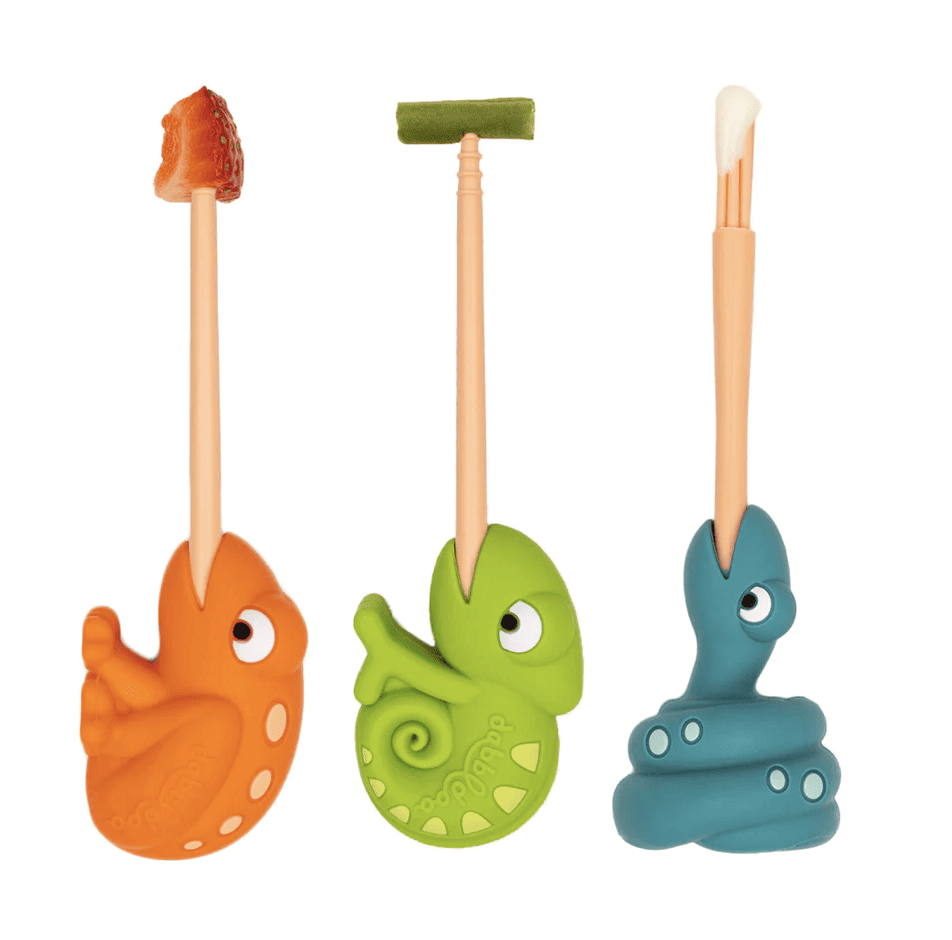
Dabbldoo Food Picks
Introducing a fun utensil can help your toddler relax and get excited about eating. Our favorite food picks are specifically designed to be safe and effective for toddlers. These are used by feeding professionals and parents to help kids explore and try new foods every day. (sponsored)
How do I get my picky toddler to eat?
There are a few ways to rethink this issue. First, if you are in the habit of short-order-cooking the foods you know your toddler will eat, you may want to consider stopping. Explain to your kids that we’re having such-and-such tonight but that you will make their requested favorite food soon. Then follow through so they know they can trust you!
Then, make sure there are one or two foods on the table that the child usually likes, even if it’s something simple like fruit or cheese. Surround those with the food you want your child to eat and let them decide what and how much of it to eat.
Using this Division of Responsibility in Feeding approach to meals can be a total GAME CHANGER, as it clearly delineates what the parent and child are each responsible for at the table, lessening pressure on everyone. It also gives the child a chance to stay in touch with their own hunger cues without prodding, pushing, or cajoling—which has the added benefit of helping to make mealtime more enjoyable for you, too.
We want our kids to know their own hunger and fullness cues so they know how much to feed themselves as they grow into adolescents and adults when we aren’t around. And those cues can be hard to tap into if they are constantly overridden by external cues (like if we push them to eat a certain amount), however well-intentioned.
You can also try to involve your toddlers in doing something to help get ready for the meal to distract them from their concern about what’s for dinner. Try letting them help to set the table, help with simple meal prep (like washing veggies), or wash their hands. Or, hand them an unexpected utensil to eat with at the table—a pair of mini tongs, a big salad fork, a tiny baby fork. That will allow them to engage with their food in a fun way, without creating more work for you.
If you are okay with cooking separate meals for your kids because it works better for you right now to know they will eat the food you make, then by all means do that.
But if you’re wanting your child to eat family meals and eventually eat more of the same foods as the rest of the family, then try the tips I just shared above.
Remember: Even if you follow all feeding advice “perfectly,” your child may still eat differently than you expect. That is normal.
It is incredibly difficult to accurately estimate someone else’s hunger. I am a big proponent of moving from the goal of “getting the kids to eat” toward “how can I make mealtime happier for all of us?”
TIP: Almost every toddler is “picky” in one way or another at some point. Toddlers are quirky—it’s part of the fun! (And the challenge, of course.)
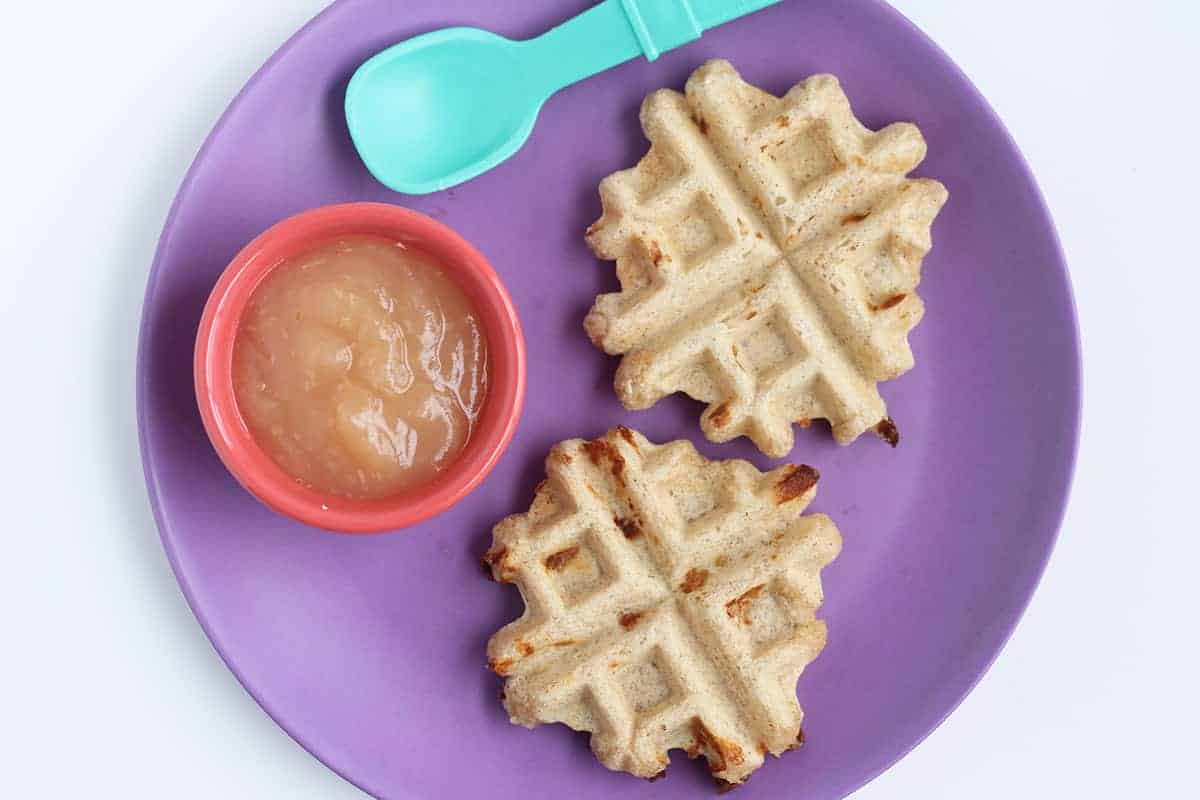
Why did my toddler stop eating?
First, if this is an ongoing issue, check with the pediatrician to make sure the child is growing, gaining weight, and meeting milestones. That is a solid baseline to know if it’s a serious concern or just run-of-the mill toddler life. If your child is playing with their food rather than eating it at the start of the meal, chances are they aren’t hungry enough to eat. Take a break and try again in 30 minutes if possible—or wait until the next snack or mealtime.
If your child just doesn’t seem hungry for any food or much food, consider how long it’s been since their last meal or snack, how much milk (or juice) they’re drinking throughout the day, how much they ate at their last meal or snack, and whether they’re teething toddlers or tired or otherwise off.
It’s very possible a toddler won’t eat simply because they aren’t as hungry as you expect them to be.
Or they may be hungrier earlier in the day and taper off with their intake as the day goes on.
If your toddler won’t eat foods he once liked, try serving them in new ways—such as cutting carrots into sticks rather than rounds before cooking them, but also remind yourself that it’s normal for toddlers to go through phases of loving and not loving foods. They may be obsessed with blueberries one week and not want them again for two months.
It’s possible they simply need a break from having certain foods as frequently. That is OK—and very relatable!
Try:
- Serve very small portions to start to keep your own expectations of how much they should be eating in check. Then, allow seconds (or thirds) according to the kiddo’s hunger.
- Space out meals two to three hours apart to allow time for hunger to build. And remember that their hunger may change during different phases of growth.
- Remember that there are simply times when kids aren’t hungry or aren’t as hungry as we expect. That is not a sign of pickiness; it’s just their way of telling us that they aren’t hungry at that moment.
- Make sure the food you are serving is easy enough for them to chew, so the food isn’t frustrating them.
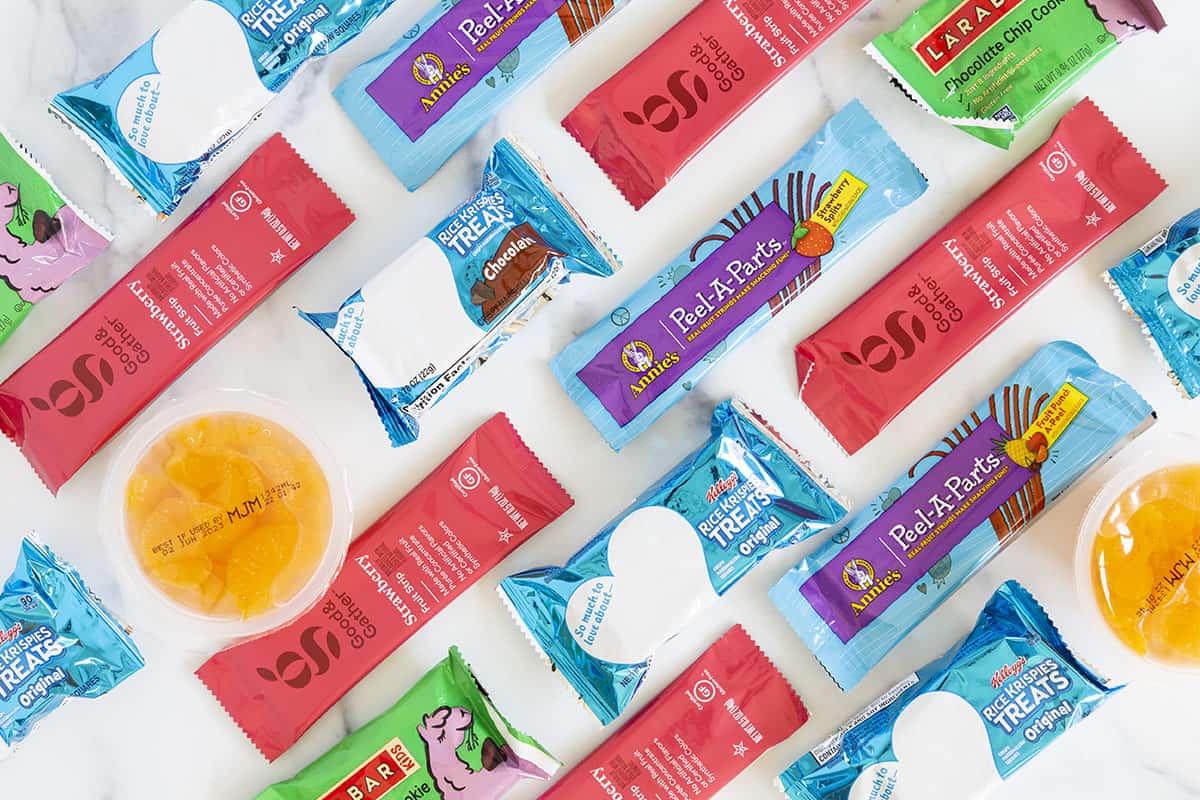
What if a toddler won’t eat anything but snacks?
Often, if a toddler knows there is a snack ahead that includes traditional “snacky” foods, they won’t eat the meal you are serving. It can help to serve “regular” food at snack time (instead of relying on crackers and fruit snacks) and to serve classic “snack” foods with meals. This can even out the appeal of all food intake opportunities.
In other words, think of snacks as mini meals and serve all types of foods at each eating opportunity.
Kids often relax when they have access to their favorite foods, so there’s nothing wrong with serving Goldfish crackers along with strawberries and a hard-cooked egg—or a chocolate chip snack bar with a banana and carrot sticks. It’s all good!
When it comes to feeding, the best thing you can do is to give your child lots of low-pressure opportunities to see (and maybe) eat a range of foods—while still offering foods you know your kids usually eat. It’s all about balance…for everyone involved.
It still counts as an exposure even if a child doesn’t eat a food. They can touch it, see it, learn what it’s called, and add to their food literacy—which can be helpful over time as they grow.
Try:
- Buy more of the foods you want your kids to eat, but include foods they love so they avoid feeling restricted.
- Serve small mini meals at snack time instead of traditional “snack” foods and incorporate more traditional “snacks” into meals—like crackers alongside soup, for example.
- Think of all eating opportunities as “mini meals” and serve all foods at all times to lessen the appeal of “snack” a little.
- Stick with a routine for meals and snacks by having them at set times (roughly) and avoiding all day grazing.
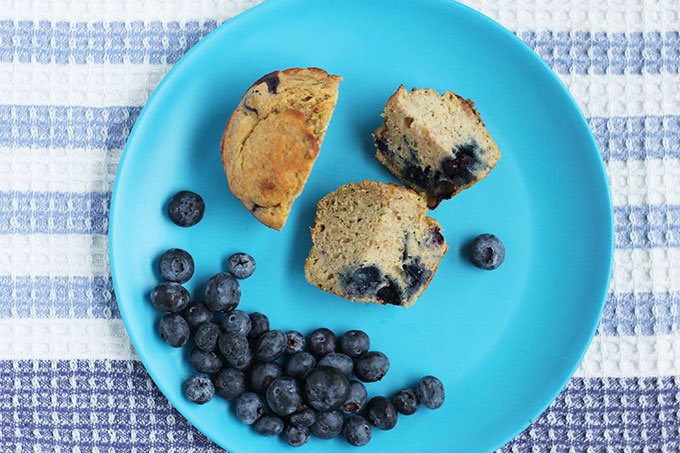
Is it normal for my toddler to refuse to eat?
There will be times when your toddler simply doesn’t like a meal you make. Whether it’s the texture, flavor, appearance, or the way the wind is blowing, we may never know the reason, but it will happen. Or, a toddler won’t eat at times because they are either not that hungry or they know you will get them something they prefer if they refuse.
A child will usually choose a more familiar, fun, and safe food when given the option. But if you pair safe foods with other ones, they can gently expand their accepted food range. Or, at the very least, have exposures to other foods (even if they don’t eat them yet).
My method is to make family dinner, including one or two foods per meal that the kids usually like even if those foods are a simple side of fruit and milk. Then, if they don’t want to eat, I can trust that they aren’t hungry.
This is a very reliable method if you do it regularly. I do realize this is hard when it’s 6 p.m. and your little one hasn’t eaten a thing for dinner. If that happens and they legitimately seem hungry after dinner, wait at least 30 minutes (so they don’t feel rewarded for refusing dinner) and offer a super boring bedtime snack like a banana. If they are hungry enough for boring food, you know they are hungry!
If your toddler seems to legitimately dislike a meal, you can institute a “backup meal” to give them the chance to satisfy hunger. Choose something plain that they would likely never choose to eat by themselves and offer that and that alone so you don’t have to negotiate in the moment. (To me, this is something that should be used very rarely since it can create more work, especially if you have multiple children.)
Good backup meal options in our house are plain yogurt with granola, plain toast with nut butter, a scrambled egg, or a bowl of cereal. We keep the options plain.
Try:
- Avoid getting up during a meal to get different food at your toddler’s request. Instead, aim to include one or two foods they usually like in any meal to ensure they always have something to eat.
- Ask the kids (who can communicate verbally) to choose between options for dinner, such as choosing which vegetable or side dish to have from two options you have on hand. Kids like to be involved in making decisions!
- Serve a boring bedtime snack if they didn’t eat dinner and seem hungry before bedtime.
- Have one boring “backup” meal option for those rare nights when they legitimately don’t like the dinner on offer—something they probably wouldn’t ask for but are happy enough to eat if hungry.
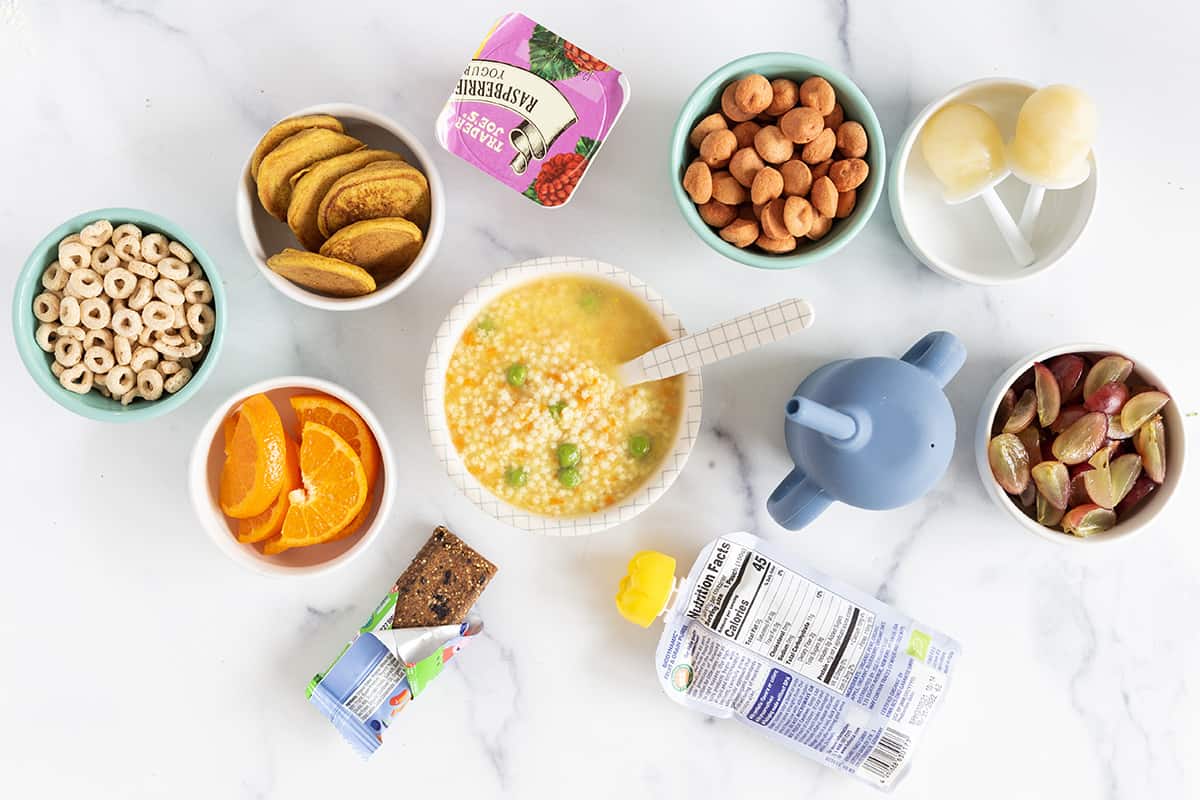
My toddler won’t eat because he’s sick. Should I worry?
When toddlers are sick, normal eating very often goes out the window. With any illness, appetites can decrease. The general rule that our pediatrician always shares is that as long as they are drinking and going to the bathroom normally, then you shouldn’t worry too much.
Keep portion sizes small, keep the actual foods simple, don’t push food too hard, and trust that their little bodies are doing what they need to feel better. You can get back to normal eating when they are feeling better, and you can always check in with your doctor. (Check out my list of best foods for sickness, too.)
Be patient since lower appetites can linger longer than you might expect, even once a child starts to feel better. And of course, check with your doctor if they aren’t drinking, there’s another red flag, or you just need reassurance from a medical professional.
Also, toddler teething can cause reductions in hunger. Try not to expect that your toddler will eat normally when they are cutting teeth (especially not with molars!) and instead offer them plenty of liquids, chilled foods, and things that don’t require too much chewing—toddler smoothies, yogurt for babies, Alphabet Pasta, Strawberry Popsicles—to help avoid irritating their already sore gums.
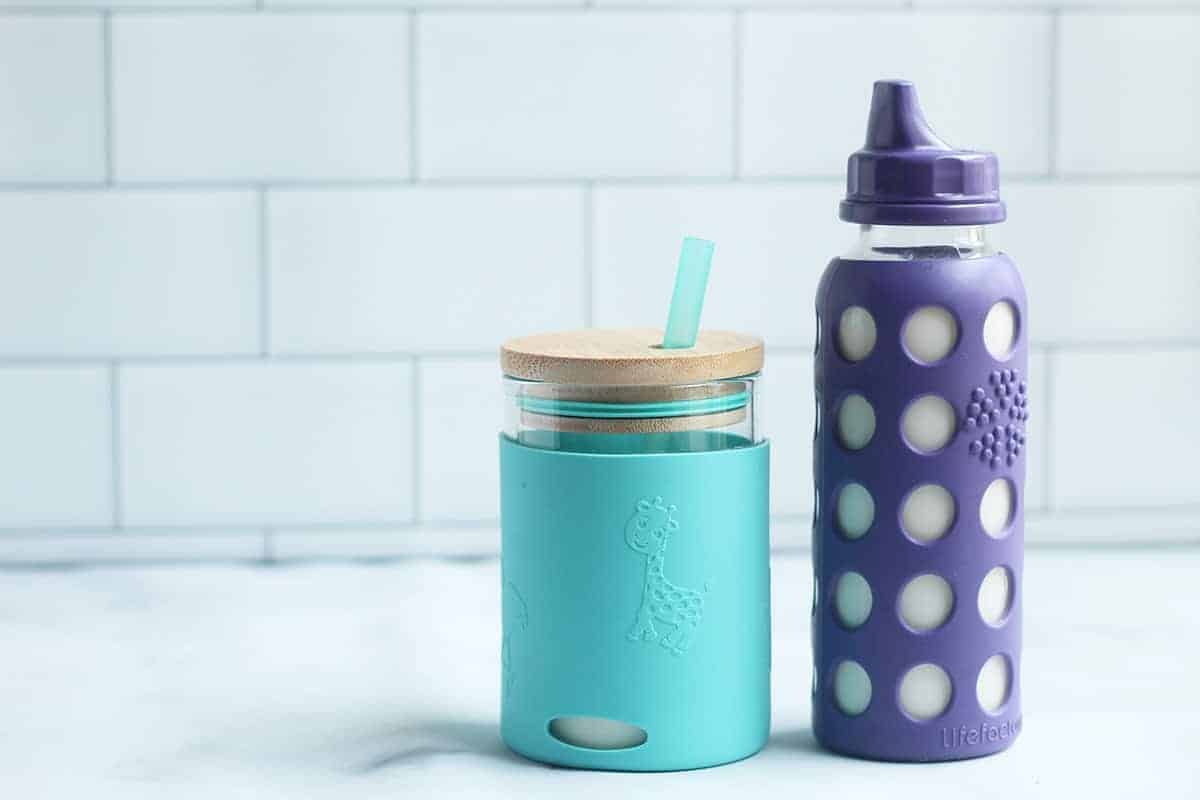
My toddler won’t eat anything but milk. Help!
If you have a toddler who’s not eating but drinks lots of milk, it’s possible that milk is filling their bellies and reducing hunger for other food. (The same can be said for any other food that they are insisting is the only food they want.)
The AAP recommends toddlers have two to three servings of dairy a day, which includes milk and other dairy foods like cheese and yogurt. A serving of milk for a toddler is ½ cup. Try serving a smaller portion of milk just at meals and offering water in between. (You may need to do this gradually, especially since milk is often a comfort food.)
Keep portion size in mind, especially if your toddler won’t eat anything but milk, since cups and bottles can be quite large. This 4-ounce sippy cup is a nice size to use at meals since it ensures that a toddler won’t fill up on milk and will be more likely to have room in their bellies for some food. A very small juice glass works, too.
You may need to taper down the volume in bottles to start weaning a toddler if that’s how they’re consuming their milk.
Try:
- Serve milk only at meals and offer water in between.
- Serve milk in a small cup (or a smaller sippy cup than you have been using) to help avoid serving too much at once.
- Start to decrease the volume of milk in bottles and work on moving milk to meals, rather than as separate feeding around 18 months.
- Remember that milk is often comforting for kids, so you may need to take a gradual approach with this.
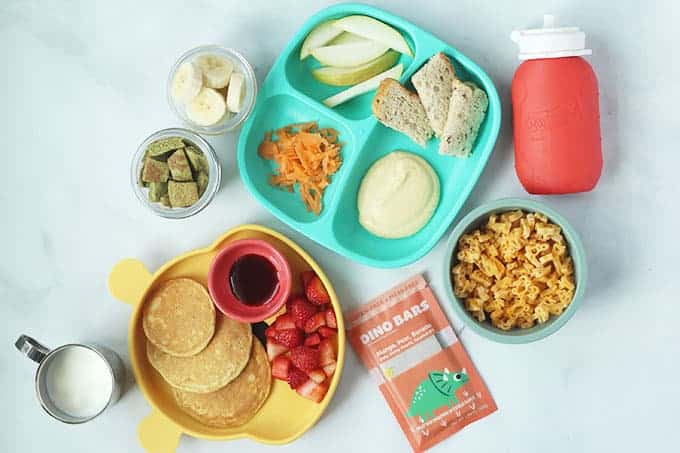
How can I increase my toddler’s appetite?
Why do you want to increase your toddler’s appetite? Are you worried she isn’t eating enough of the “right” foods? That she is “too small”? Is she low on the growth curve? A good question to ask is whether her growth is consistent with her own history, not as compared to other kids her age.
Every toddler grows at their own unique speed, and it’s possible she is exactly the size she needs to be—and is eating a perfect amount for herself in her current phase.
If your toddler truly doesn’t seem to be eating enough (remember, they may eat only a quarter as much as an adult does… you may need to adjust your expectations!) and there is a medical concern—such as if they have fallen off of their growth curve or are losing weight—you can try serving smaller snacks and meals more often, adding lots of healthy fats to their food, and getting them involved in the kitchen.
Here are some foods that may help a toddler gain weight, including my Kids Weight Gain Shake, Chocolate Protein Shake, and
Sometimes just being around food in a situation without pressure can encourage a kid to explore and enjoy more at the table, too.
Be sure to check with your pediatrician to make sure you’re on the same page about a plan if there’s a weight-loss issue.
Why won’t my 1-year-old eat?
Toddlers don’t grow as rapidly as babies, so while your child may have eaten a lot as an older baby, he might not be as hungry now. This is very, very common in 1-year-olds.
One-year-olds are also BUSY. They have a lot going on in their little worlds and many constantly want to be moving.
Avoiding distractions at the table can help a toddler focus on their food, and keeping a consistent mealtime routine—when meals happen, where they happen, and what’s generally expected during a meal—can go a long way toward happier mealtimes for everyone.
One-year-olds are also just discovering that their actions have consequences, so they may not eat (or they may throw food or do all sorts of other behaviors) simply because they’ve realized that they can. Keep your reactions during meals as low key and consistent as possible so they don’t try to get you to react. (I fully understand that this is really hard.)
(My favorite recipes for 1-year-olds may help give you some easy ideas, though.)
Try:
- Limit distractions at the table, and sit and engage with your child during mealtimes, as is possible.
- Keep your reactions to undesired behavior neutral, consistent, and swift. (If they throw food, end the meal or at least take a break; if they spit out their milk, remove their access to milk; etc.)
- Give toddlers time to work up an appetite between meals—and avoid letting them graze all day (or at least acknowledge they are getting their calories throughout the day that way).
- Remember it’s NORMAL for a 1-year-old to be less hungry than they were as a baby. They may eat less than they used to, and we might need to adjust our expectations. This often shows up around 14-17 months; it is not “pickiness”—it’s a normal decrease in hunger.
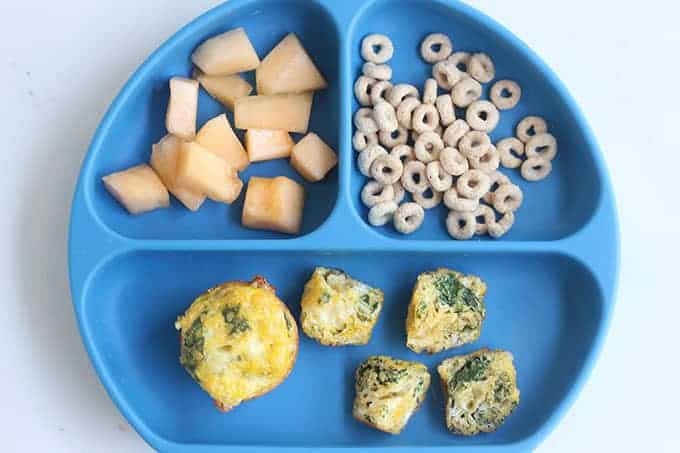
Why won’t my 2-year-old eat?
Outside of illness or teething, a 2-year-old won’t eat for similar power dynamics as above, but they also may be much more sensitive to new foods due to a normal phase called neophobia. This fear of new foods, which usually spikes between 2 and 6 (though it can start at 1 year old), can cause them to refuse foods they once loved and foods you think they will love.
It can also cause them to refuse to want to eat foods mixed together or foods with certain textures.
Try to remember that this is a normal phase of development that will, in all likelihood, pass eventually. Researchers have found you may need to offer a food 8 to 15 times before a child may willingly try it. In other words, keep offering the foods you want them to eat regularly in small portions and without pressure, and eat those foods in front of your child.
Because even if they don’t want it today, one day they just might surprise you some day in the future.
(Two of my kids literally refused beans for two years at our weekly taco night. Then one day, they each decided to try them. It took forever, but it wasn’t really a big deal—since they had other foods on the table during those meals they could eat—and they got to that food in their own time.)
For 2- and 3-year-olds, serving family-style meals can also help to diffuse power struggles at the table. Simply put the components of the meal in bowls on the table and encourage and help your toddler decide what they’d like to eat. Don’t force bites of everything, unless your child responds positively to that approach, but give them space to choose what looks appealing.
This small amount of ownership over what goes onto their plate can be extremely helpful for strong-willed toddlers. A lot of times, all they really want is to feel like they have some control over their lives.
Try:
- Ask your child “how can I make this yummier?” to see if they can help you figure out how to make their food more appealing.
- Serve family style meals to diffuse power struggles and let them choose which foods to put on their plates.
- In each meal, include one or two safe foods they usually like to ensure they always have something to eat if they are hungry.
- Trust their appetites, which may be different than you expect and may vary a lot from day to day.
Why won’t my 3-year-old eat?
A 3-year-old may not eat for reasons similar to a 2-year-old, but they may also have more words to express themselves—so they may be more dramatic in their response. They may not be as hungry as you expect, their appetite may be unpredictable, or they may be worn out by the time dinner rolls around. (That last one is fairly common!)
Three-year-olds also know how hard they need to push to get what they want. Toddlers at this age benefit from set expectations at mealtimes and routine. Which is to say, if you start getting up to get them foods other than the ones you’ve made for dinner, they will continue to demand that you do that.
There’s no rule that says that a toddler needs to eat every single thing you serve for dinner. If they eat some of it, there’s decently good behavior, and minimal crying, that can be defined as a happy meal. Keep the bar low, my friends, and you might find that things are better than you realize!
Try:
- Serve family style meals and let them choose what to eat from the foods you put out.
- Let them choose what to have for dinner from two predetermined options so they feel like they have more power.
- Serve very small portions to start to avoid overwhelming them.
- Include one or two safe foods they usually like in each meal to function as safety nets in case they don’t like the main dish.
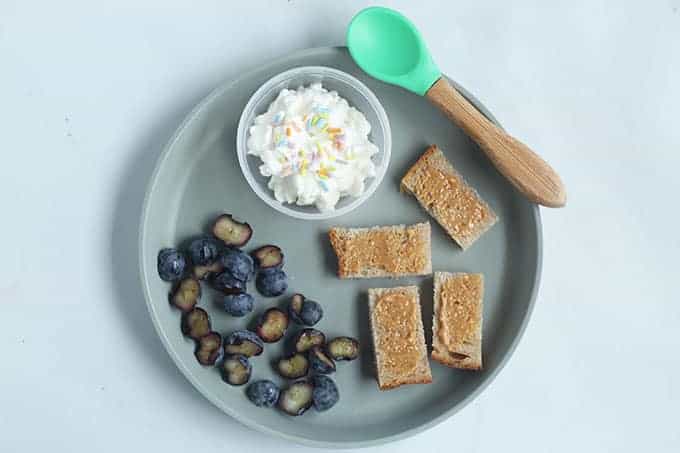
My toddler won’t eat breakfast. Why?
You may simply have a child who isn’t super hungry first thing in the morning. Try to give them a little time to wake up before sitting down for breakfast and/or serve a smaller portion for toddler breakfast and increase the amount of the morning snack.
If your toddler drinks milk or breastfeeds in the morning, it’s possible they have a full little belly that doesn’t have room for food. Keep that in mind if your toddler won’t eat breakfast and adjust expectations accordingly—and perhaps also serve smaller amounts of food.
My toddler is constipated—is that why she won’t eat?
It’s certainly possible! If a little one (or anyone, really) feels uncomfortable in their belly, the idea of putting food into it may not be appealing. In addition to fiber, having enough water is key to alleviating toddler constipation, so offer lots of water to drink throughout the day, along with hydrating produce like melon, cucumbers, berries, and zucchini.
You can also try to include healthy fats (avocado, coconut oil) in their diet, or try a Constipation Smoothie, as they, too, can help food more easily move through the digestive system. And remember: Each kiddo has their own “regular,” so it’s possible that your toddler needs to go once every two or three days…or three times a day.
If your toddler has been holding it all day at school, he may not want to eat dinner because he’s uncomfortable. Try to give him a chance to use the potty, with as much time as is needed to relax, before dinner.
Why does my toddler always want a bedtime snack?
If your toddler has some time between dinner and bedtime, she very well might be hungry before bed. You could either push dinner back a bit or institute a regular bedtime snack. This is a tactic I read about in a book and it makes sense.
If there is always an easy bedtime snack, you won’t have to renegotiate it every night. And you also won’t have to worry about sending your child to bed hungry if you are prone to that particular concern.
I’d just caution against making the snack something they LOVE because kids may recognize that they can simply skip dinner and have the snack they love instead. If a child regularly asks for a snack right after dinner, it may be a habit (or a bedtime delay tactic!), not true hunger. Try “you can be hungry for breakfast” or “if you’re really hungry, you can have a banana.” Both of those phrases can work wonders to suss out true hunger.
Try:
- Find super simple healthy bedtime snacks in this comprehensive post.
Frequently Asked Questions
Always check with your pediatrician with serious concerns and consider if the amount of soiled diapers has decreased, if there is an issue with growth or weight gain, if they are missing milestones. Or if something just seems off to you as their parent.
First consider whether it’s possible that they simply are not hungry. Then, offer an easy way to make the food yummier, such as a dip. Sit and talk about other things and know that not every kid likes every food.
Many do, though it’s usually simply being less hungry than they were as compared to when they were babies since their rate of growth typically slows.

How do I know if my toddler’s eating problems are serious?
Here’s some great advice from Katja Rowell and Jenny McGlothlan, the authors of Helping Your Child with Extreme Picky Eating:
“Ask yourself: What is your underlying fear? The point is to figure out what you are worried about, and then find out if you need to worry (or not) from a book, a doctor, or dietitian. If you don’t need to worry, you can direct your energies to more productive things like supporting your child’s eating. If a problem is discovered, like an oral-motor delay, then you can get that addressed. Studies suggest that between one- and two-thirds of all young children will be described as ‘picky’ in early childhood.”
If there is a growth delay, severe reactions to different or toddler texture aversions, regular gagging, difficulty eating or digesting, oral-motor delays, muscular disorders, or any other issues that make eating difficult, reach out to your pediatrician and/or a feeding therapist. They will be best suited to help you work through the issues.
Bottom line: When a toddler won’t eat, it is not a judgment on our cooking skills or our parenting skills. A lot of it has to do with the developmental stage they are in—of learning and exploring boundaries—and simply seeing how much power they have. Hang in there!
Related Recipes
Did I miss anything? Comment if you have a question!
This post is not meant to be a substitute for medical advice. Please consult with a pediatrician or a feeding therapist as needed.
This post was first published April 2018.
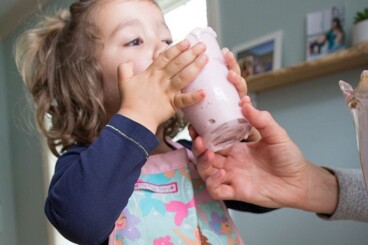
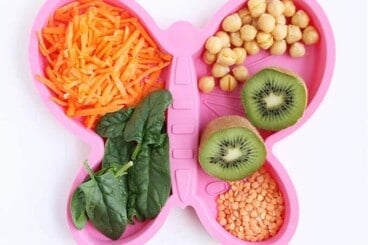
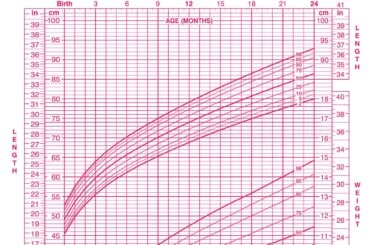


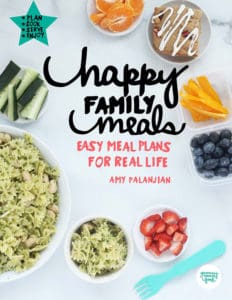

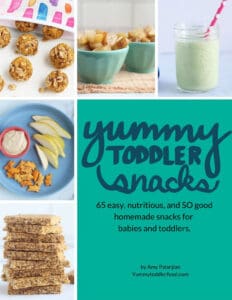














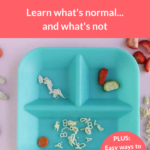
My 20 month old will only eat a small rotation of the same foods over and over again and will not try anything new regardless of repetitive offering. Would you consider this pickiness or perhaps a bigger issue? I considered seeking outside help but what can a therapist do that we haven’t already tried?
Hi- It depends. Other things to consider include: Are they growing, gaining weight and meeting milestones? Do they seem fine otherwise? Are there any specific noticeable texture challenges? Is it possible that they are simply not as hungry as they used to be? What is the total number of accepted foods over the course of a week? This age of 1.5 is a very classic time to see this behavior because growth often slows compared to babyhood, they are more aware of their own power to say no, and they are clearer on what they like. It may be a phase or it might be a sign to see what things you can do to help. But looking at the broader context will help.
Hi Amy – love your cookbook and site! Hoping to get you opinion on the difference between snacks and dessert (like a Yasso bar) – I like the suggestions on bedtime snack ideas. I have a 3 and a 5 1/2 year old. If they are not hungry or don’t eat a lot of dinner – which seems to be a lot these days with camp and the heat – (even with a few safe foods in there), what do you think about when they then ask for dessert? I don’t want to make sweets seem like a restricted food, and I would never say you have to eat dinner to get dessert, but I’m trying to think about how to be as sane as possible for them about understanding their hunger and navigate that scenario (which seems to be coming up even more in summer when ice cream and popsicles seem like a great idea on hot nights). Always appreciate your insights so would love to hear any thoughts! Thank you!
Hello, how do I get your snack recipe
You can use the search to find what you’re looking for.
Great article thank you for sharing.
Our 3 year old almost always refuses dinner or any meals made. Will only eat snacks or things from a package :/ I do try not to stress about it because she’s healthy, growing, and I’ve Learned to let them listen
To their bodies. Sometimes I fed her in the bathtub!!!! And she’ll eat the whole Dinner there, even if she refused to even look at it at actual dinner time.
I try to at least buy healthier snack foods, or:Made Good (there’s hidden veggies in)
But lately sometimes she’ll wake up in the middle of the night (~3am) and be hungry because she refused dinner that evening. At this point her go to is always the Made Good bar, or a banana. Once she has that she will happily go back to sleep. I kind of feel this is forming a habit but I’m not sure what else to do? I don’t think saying “you can be hungry at breakfast” would work for her.
Hi- Have you tried offering a snack right before bed?
Hello,
Thank you for this in-depth article. Definitely a few tricks I plan to try!
A couple questions for our scenario (and maybe another mom out there is wondering too):
My daughter is 23 months old. For the past couple months dinnertime has been our struggle. She won’t eat/stay at the table long or eat much. Sometimes she will eat a little more if we let her sit on the couch with the TV on or I even have to spoon food it to her for example. I know the TV/couch are not ideal but it’s about 10 feet from our dining table and after trying at the table on a weeknight this momma is tired (currently pregnant with daughter #2).
Overall, she eats fine for breakfast and lunch plus snacks. She does love her milk and I’ve been trying to cut her back on that. We still use transitional bottles (first one in the morning and a nighttime one). These are her favorite kinds of bottles. But I do want to get her off of these soon as she’s almost 2 years old. I would estimate she has about 5 ounces in the morning, 5 ounces around 7:15 pm and then she probably has some during the day. I’m not sure how much she drinks at daycare but she does not get this specific bottle there. I would guess/estimate she’s drinking around 15 ounces of milk a day. Possibly a little more. She also eats a yogurt pouch daily and usually a string cheese too. Right now, she seems to be getting molars (we think) so it’s been a very bad week for dinner (and sleep)!
After reading my long-winded backstory for where we are at right now, what tips do you think would be the most helpful or impactful for us right now? Maybe I just need to accept she’s not that hungry for dinner (she will usually snack on fruit or crackers about an hour after I offer dinner). But I can’t help but think her more frequent overnight wakeups are partially due to hunger.
Thank you!
Chelsea
Hi- Generally speaking, it’s very normal for kids to eat less at dinner so given what you describe with her intake over the course of the day, it’s totally possible that’s what’s happening here. With the bottles, you could try moving the ones at home to be served with meals instead of separate from them. Or, start by changing to a sippy cup (let her help choose it, make a big deal of changing to a big girl cup if you think that might help her). It doesn’t sound like the total volume of milk would be considered “too much”, but moving those servings to be with meals could help transition away from the bottle being a stand alone snack or meal if that makes sense. Also: Do what you need to right now given your energy levels. That is always valid too!
My grandson will not try anything that’s unfamiliar to him we’ve tried everything but he just goes into a meltdown. He’ll he boxed Mac & cheese, bananas, Dorito chips, applesauce in the squeeze packs, and gummies, but they have to be a certain brand or he throws a fit! He’s going to be 5 this November still isn’t fully verbal due to an oversight of tongue tie until he was three. So he’s way behind where he should be, in milestones. I’m the grandma but I need to find a way to get him the help he needs! What can I do?
Hi- If that is the complete list of his accepted foods, it may help most to work one on one with a responsive feeding therapist. You could ask your pediatrician for referrals to someone in your area to start. It may help to see if there are ways to give him more control over choosing his foods in the interim to help avoid the meltdowns, so include one of his safe foods and then a choice of two other foods that he can pick from. This won’t be magic, but it may over time help him see and learn about other foods. I am sorry this is so hard.
Great article! My 1-year old is showing all of the behaviors you mention. It’s so hard not to get up to get his favorites (blueberries!) so that we know he’s eaten SOMETHING. If I end the meal when he’s showing that he’s not interested/hungry, what suggestions do you have for him being cranky shortly after because he’s hungry (even though he won’t eat the food we’ve served)?
I think it may depend. I would try to include 1-2 foods in the meals that he usually likes (even if it’s not always the absolute favorite) and then some options might be: Save some of the food and put it aside for him if he changes his mind and offer that after if he’s hungry. Remind him that we can have snack soon, but we’re going to go do this other thing now. If it’s dinner, you can have one basic bedtime snack option that’s always available that’s not terribly exciting but is a chance to eat if they are hungry. We do a banana in our house. There’s no one size fits all answer since it depends a lot on the context, but I hope that helps a little
My nearly 4 yr old had severe acid reflux up until age 3. Food is not a joy for him even though he loves to cook and help prepare meals. He will only eat plain pasta,noodles & chicken nuggets or snacks. How can I get him to try more foods, he won’t eat any fruit/vegetables or meat. How can I get him to try more foods?
He may need time to become more confident around foods that once caused him discomfort. You could try letting him interact with more foods away from the table (choosing produce at the supermarket, helping to wash things, helping to prepare foods to cook) as a safer place to start. A feeding therapist may also have helpful options to help him work through some of this too.
This is a great article. Very complete and informative.
I sent this to my husband, he thinks i have to season the food more in order for our baby to eat it. He is 18 months old and some days he just barely touches the food.
It’s possible that flavor may help, but also remember that 18 months is a very common age for appetite to decrease as compared to how it was previously as growth slows down compared to babyhood. So it’s possible that he’s in a phase of being less hungry and it may ebb and flow as he grows.
Hi,
My son who is 1year 10 months old only depends on breastfeeding. Earlier he used to eat small portion of yoghurt and rice blended but now he is more relying on breastmilk.. pls tell me if this normal.. I have tried all sorts of food.. but he doesn’t like at all.
Hi- It is not uncommon for one year olds to fill up on milk (whichever kind they may be having) and since appetite in one year olds usually goes down as compared to when they were babies since their growth slows, he may not be hungry for food if he’s breastfeeding a lot. You could consider playing with the order in which you’re offering both to see if food first might help him eat a little more. Or see if you can reduce how many times a day he’s nursing by one or two. He may be missing some key nutrients (such as iron) if he’s not eating many solids and he may not be able to adjust that intake on his own. You may also want to talk with your doctor if it continues. I am trying to be very respectful in not telling you to wean, but instead look at the volume of breastmilk over the course of the day and recognize he may need less in order to feel hunger for food. I know this is a hard phase.
My son turned 3 in October , and he use to eat everything up until the age of 18 months Now he will only eat fruit, cheese and dry cereal . He has milk before bed that i have even diluted with water , just cant get him to eat . We have been offering foods he use to like with things i know he will eat but its been more than 18 months and still no change
Should i stop snack times ? Or stop the fruit ?
We have done the “ im responsible for supplying the food , he is responsible for eating it “
It is getting so bad that hubby and i are arguing about it all the time . I wont bribe and i wont argue about eating at the table
This is such a great read, and opened my eyes to so much! My 2.5 year old all of the sudden won’t eat anything he used to, and definitely wont touch anything new. The only thing we can count on is fruit or cottage cheese (or anything sugary). Dinner especially is a huge fight. Going to try family style meals…hoping to see progress soon!
I hope it helps a little! (And also maybe remember that many little kids just aren’t as hungry as we expect at dinner so that may be part of what’s at play too, especially if it was a fairly sudden. Growth may have slowed a bit, which is normal.)
Hello 👋 my son is 2 and a half and I know this may sound crazy but he only eats Oreos, baby rusks and Cheetos and I have a 4 and a half old daughter who eats all kinds of food which a lot of homemade and fruits and all above because I make a lot of homemade but my son at some point did t eat anything so this all he took and ate for 2 years straight after getting off baby food me and my husband don’t know what else to do because he would cry for days we asked his pediatrician they say just let him cry he’ll want real food but he’ll hold off for days and I don’t think that is ok.
Hi- If those are really the only foods he eats, I would NOT serve him other foods and wait for him to just eat them because that is not a method that works for every child and is bound to exacerbate feeding issues (especially emotionally). I would ask your pediatrician for a referral to a feeding therapist as this sounds to me like what would be considered outside of the normal picky eating stage. If you’d like some online options, let me know and I can send them to you. I hope you find some help soon!
My 32 months daughter refusing eat any thing only she take yoghurt drink and refuse any thing else what can I do ?
If she’s really only eating one thing, I would check in with your doctor and also keep in mind that this could be normal if there’s something else going on like illness or a change in her routine of some sort.
My 4 year old start pre school and refuse to eat breakfast and lunch. Before school he would eat what I prepare. However, I notice since he start preschool he is not eating his lunch and refuse to eat much for breakfast. He stress the fact of not wanting to go to school and is not a happy camper at all. I made almost everything he like and cut up his fruits and still he won’t eat.’He has never been around anyone one other than family and this change is very overwhelming for him. What can I do?
This is so challenging, but is fairly common. I would try to stay in communication with his teachers, make sure that his food is familiar and easy to eat if you’re sending it, and try to offer a substantial breakfast and snack before and after. Hopefully it will settle down soon!